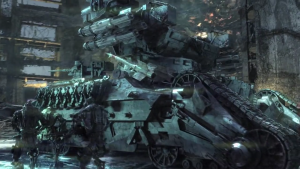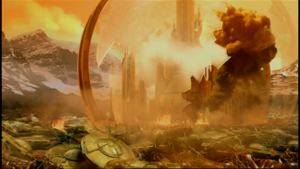4 Sci-Fi Wars with Massive Repercussions–Friday Four
- June 26th, 2015
- Posted in Lists
- Write comment
 After looking at 4 of the biggest changes to the status quo just a few weeks ago, I thought it might be an opportune time to take a moment to see just how that status quo emerged in the first place. In most sci-fi works, or hell, most works set in the future at all, there are a few easy ways to fill in that gap between the story’s setting and the present era, and the main one is with a war. Wars happen all the time in real life, so it’s a logical thing to carry forward into the future; and wars, as most obviously seen in World War 2, often have huge effects on the balance of power and shape the world for decades to come. It’s a good way to explain why things are so different, or even why they aren’t quite as different as they should be. So here are 4 (usually offscreen) wars that helped establish the sci-fi worlds we’ve come to know and love.
After looking at 4 of the biggest changes to the status quo just a few weeks ago, I thought it might be an opportune time to take a moment to see just how that status quo emerged in the first place. In most sci-fi works, or hell, most works set in the future at all, there are a few easy ways to fill in that gap between the story’s setting and the present era, and the main one is with a war. Wars happen all the time in real life, so it’s a logical thing to carry forward into the future; and wars, as most obviously seen in World War 2, often have huge effects on the balance of power and shape the world for decades to come. It’s a good way to explain why things are so different, or even why they aren’t quite as different as they should be. So here are 4 (usually offscreen) wars that helped establish the sci-fi worlds we’ve come to know and love.
4. The Eugenics Wars–Star Trek
Most people know of the Eugenics Wars for one reason–KHAAAAN!!! (sorry, we had to get that out of the way). But actually, the Eugenics Wars make up a pretty significant part of the Trek universe’s backstory. Genetic Engineering, and transhumanism in general, are basically banned from the Federation purely as a result of this war, hence explaining the lack of heavily modified humans or cyborgs or any of the other common human-derivatives we see in other sci-fi. Storylines following the consequences of the war show up in three of the five series (TOS/ENT/DS9), and there are ambiguous references throughout TNG that might also be referring to it. Heck, part of the reason that the Borg are such a great foil for the Federation is that they’re at least partially representative of the same “improvement without concern for consequences”-type thinking that fueled the Eugenics Wars in the first place.
3. The Unification War–Firefly
For a space Western, a civil war in the backstory was practically a must; it provides a reason for some of these people to be living on the fringes of society. And why they’d willingly go live in, frankly, rather backwards communities as opposed to glorious sci-fi cities. The Alliance stomped the Independents into the ground, but some of the old Browncoats, like Zoe and Mal, weren’t going to just lie down and live under their rule afterward. So they take to the stars in an old beat-up spacecraft, and that’s how we start our show. Unlike most of these on the list, we do get to see a bit of the war in flashback form in the original pilot “Serenity,” and seems like a very ugly conflict from start to finish. While it’s long in the past for most of the world of Firefly, it makes up such a huge part of the motivation of our characters that it’s relevant in a surprising amount of our 14 short episodes.
2. The First Cylon War–Battlestar Galactica
The Galactica is able to survive the initial invasion seen in the BSG miniseries for one reason and one reason only: it’s an outdated piece of junk, left over from another era. And that era is the First Cylon War, forty years prior to the start of the series. Galactica keeps things as low-tech as possible as a defense against the Cylons’ hacking abilities, a tactic which faded away over the years as the Cylons seemed like less of a threat. Bill Adama fought in the First Cylon War as a rookie pilot, which was partially depicted in the ill-fated Blood & Chrome pilot-movie-webseries-thing. The Cylons, of course, made huge strides in the period between the show and the war, and the beginning of the miniseries is set in the truce room where the Colonials had been waiting for the Cylons for decades. Caprica also shows the creation of those early Cylons who would eventually rebel, and the ideology on which their rebellion would be based.
1. The Last Great Time War–Doctor Who
I like to harp on the Time War from time-to-time (and I think I’ve expended my allotment of “time” uses for the entire entry already), because it really is a great explanation to bridge the gap between Classic and New Who. As far as the revived series is concerned, it’s all backstory. It removed the Daleks and the Time Lords both from play early on, and let us slowly work them back into the show in such a way that they could be seen as a serious threat again. It made the Doctor a unique and mysterious figure again, a man who is so wrapped in rumor that even his home is but a legend now. The weight of his decisions in the Time War define his character throughout the Ninth, Tenth, and Eleventh Doctors’ runs. As usual, we only see bits and pieces of the conflict on screen, including in the webisode “fall of Arcadia” and the 50th anniversary special, which mostly show the final days of the war. It also provides the basis of “The End of Time”, which depicts the Time Lords’ attempts at evading their fate at the war’s end. And all this on top of explaining why the Doctor had been absent from our screens for the last 15 years!
Any other fictional wars that you feel deserved a spot on the list? There are enough of them out there, after all. Tried to keep this one limited to TV, but movies are just as prone to doing this. Let me know in the comments, or on Twitter @RetroPhaseShift.








this is a really clever topic, nicely done!
limiting to things that are historical or mostly unseen, i would definitely add the earth vs minbari war that takes place before babylon 5, as well as the humans vs skynet war from prior to t1\t2. before those were fleshed out we only got glimpses of them and their dire implications.
i think tng mentions ww3 a few times instead of (and is a separate thing from) the eugenics wars right?
dan
I did consider both the Earth-Minbari war and the Machine War from Terminator, actually. I decided to keep it to TV mostly and also tried to focus on ones that informed the backstory without getting a whole lot of focus. And really there are a ton of different wars in the backstory of B5 that you could use, so instead of trying to figure out which one to pick I just chose a different show entirely. :p
WW3 is mentioned a number of times in Trek and it’s occasionally been retconned into being the same conflict as the Eugenics Wars, but not always, so it’s a little confusing. This is mostly because Khan’s ship is explicitly stated to have left Earth in 1996 and that obviously makes no sense these days, so various attempts to explain how that works leave things muddled.
We do see the fallout of WW3 in First Contact, which gave the Eugenics Wars a bit more of an edge when it came to deciding which one to feature. Lots of sci-fi features a WW3, but not many have wars over Eugenics in the background.